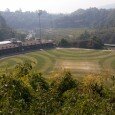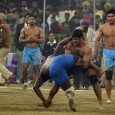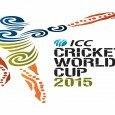By Ramaswamy Mohan –
Frission is what makes Indo-Pak cricket rivalry so different. There’s so much intensity on the pitch as to frazzle the nerves
It’s the frisson that makes it so different. There may be many rivalries in cricket that are older than India-Pakistan contests that date back only to 1952. But the manner in which these battles on the cricket field set the pulse racing in millions and millions of people of the subcontinent makes them unique.
Resumption after a five-year hiatus in bilateral ties will make the current ODI series even more special even if it’s only about a year since the Pakistan team jetted into Chandigarh to play India in the World Cup semi-final in Mohali.
The clarion call for the cricket exchanges to begin again even as the two prickly neighbours kept diplomatic talks going at various levels came from the Pakistan President Asif Ali Zardari when he called on the Indian Prime Minister Manmohan Singh in the capital while on a pilgrimage to the famous dargah of Christi at Ajmer last summer.
The signs on the ground were also just right then although the 26/11 terror attack on Mumbai landmarks of 2008 still remains an irreconcilable bone of contention between the two nations.
The Indian government’s green signal to BCCI to invite Pakistan for a limited-overs series may not have been universally popular. Even Sunil Gavaskar, a proponent of cricketing diplomacy over the years, stated his opposition while reminding fellow Mumbaikars and Indians that 26/11 wounds had hardly healed while Pakistan is being seen to be dragging its feet over bipartisan investigations into the terror attack.
Sunil Gavaskar, a proponent of cricketing diplomacy over the years, stated his opposition, saying, “Being a Mumbaikar I feel what is the urgency when there is no co-operation from the other side (on Mumbai attacks probe)?”
Gavaskar said, “Being a Mumbaikar I feel what is the urgency when there is no co-operation from the other side?” He was later to add, “Well, my first reaction is that the time the players have between the England series, it is not going to be there. They are playing England in November-December but now they are not going to get the breather.”
Indian cricket fans are, however, ecstatic. While inevitable meetings in World Cups around the world are just about sufficient to whet the appetite, only a tour of the country would suffice to satiate. And with a million dollar question mark hanging over touring Pakistan to play, a tour of India is the best way to take cricket diplomacy forward.
Kapil Dev says, “The series is a good development”, and then enigmatically adds, “Please don’t bring politics in sports.”
Of course, that is a near impossible proposition as politics and cricket go hand in hand in the subcontinent, although it can be said that cricket ties were at their best when diplomatic relations were most strained and vice versa.
As India’s champion all-rounder who began his international career in Pakistan in 1978, the Haryana Express has had a long history of brushes with Pakistan players on the field and plenty of friendships built off it. As a Punjabi, the vibes between India’s World Cup winning captain and mostly Punjabi-speaking cricketers from across the border were always special.
I remember listening to long conversations between Kapil and Abdul Qadir in chaste Punjabi without understanding a sentiment or two expressed. But the bonds that cricket built were always seen to be so special.
The on-field competition is known to be so fierce that incidents frazzling the nerves on either side or both come as no great surprise. Having helped Imran Khan put his thoughts down for his columns, I grew pretty used to hearing a voice of reason from the other side.
 I know how much empathy he felt for the Indians when students of Sindh disrupted an ODI in Karachi and a Test match in Hyderabad on the 1989 tour. But such incidents are rare in an age in which security at grounds has evolved much more into a fortress mentality among the forces.
I know how much empathy he felt for the Indians when students of Sindh disrupted an ODI in Karachi and a Test match in Hyderabad on the 1989 tour. But such incidents are rare in an age in which security at grounds has evolved much more into a fortress mentality among the forces.
Incidents on the field could be pretty explosive, too, as it was when Bishen Bedi protested over short-pitched bowling at Sialkot in 1978. But all that has been forgotten long ago with Bedi now welcoming the Pakistan team visit with open arms.
The colourful Sardar of spin who delighted many a Pakistan with his wry humour said, “We are living in free India, there are those who oppose, but I am of the view that there should be matches between India and Pakistan. Cricket is a separate thing from politics; the two should not be mixed. If cricketers are ready to play, then why not?”
Bedi is sure the series will add to goodwill even as it whips up great interest among the fans. “I am not interested much in a Pakistan team being invited in the Champions League T20. I am more interested in the two countries playing against each other,” he added.
Sachin Tendulkar, who is another giant in the Kapil Dev mould with a debut series in Pakistan, is all for cricket with Pakistan. He fondly recalled the good time he had on his first tour in 1989 when he quickly transformed from talented boy to battling man as Imran Khan unleashed a bouncer barrage at him by proxy via Waqar Younis and Wasim Akram in the Sialkot Test.
Indian cricket fans are, however, ecstatic. Kapil Dev says, “The series is a good development”, and then enigmatically adds, “Please don’t bring politics in sports.”
The Little Master remembers best the fine Pakistan cuisine that made him put on weight on tour. “I used to have a heavy breakfast which was keema paratha and then have a glass of lassi and then think of dinner. After practice sessions there was no lunch because it was heavy but also at the same time delicious. I wouldn’t think of having lunch or snack in the afternoon. I was only 16 and I was growing,” Tendulkar recalls.
Besides the cricket, there is also the varied cuisine to be had in both countries and then the non-stop partying that can be a bit hectic in India.
In fact, Inzamam-ul-Haq has warned his countrymen not to indulge in too much partying. “But for that the players will have to really focus on cricket only. Touring India is always a great experience for Pakistani players and there are distractions but the players must concentrate on the series and on winning it,” Inzamam has been quoted as saying.
He should know as he led Pakistan out here on a number of occasions. The warmth of people-to-people relations has always been a fascinating subject for study. It’s hard to gauge who is friendlier to cricket visitors — Indians or Pakistanis.
The results have been up and down over the years with Pakistan dominating at the resumption of ties back in 1978 but India seized the initiative at home in just the year after in a Test series before which Sunil Gavaskar said “India would be pulped” and later clarified that he said it only to wake up his troops. The Sharjah experience was again up and down for teams with India seizing the initiative in 1984 before the pendulum swung completely the other way after the famous last ball six.
Bishen Bedi says, “We are living in free India, there are those who oppose, but I am of the view that there should be matches between India and Pakistan. Cricket is a separate thing from politics, the two should not be mixed.”
“Please don’t remind me of it,” says Chetan Sharma whose planned yorker length became a full toss. Miandad, sitting in Sharjah cricket supremo Abdul Rahman Bukhatir’s office the next morning, was to tell me “I knew it would be a full toss.”
Indian cricketers lost the edge after the six that seemed to change the cricket world. Not until 1992 when India beat Pakistan in Sydney in the World Cup did another chapter begin.
Remarkably, in the next 20 years, India always beat Pakistan in World Cups, be it 50-overs or 20-overs and regardless of which team went on to win the cup. The semi-final meeting in Mohali last year wove another remarkable chapter, played as the match was in a virtual battlefield with a no-fly zone ordered over the ground and anti-aircraft guns being positioned to tackle any eventuality. Pakistan folded once again to allow India to stretch their unbeaten sequence.
As a general rule, bilateral ODIs are more relaxed affairs with any result possible. If India has a very talented bunch adept at the 50-overs game, Pakistan have the bowlers to contain the best of strikers. The contests may boil down to which team wants to win more. The old tensions don’t exist so much now as the teams have met so often as to have seen both sides of the sporting spectrum.
The very fact that Pakistan can just cross the border and get some international cricket with the distinct subcontinent flavour is important for their cricket. And Indian fans need quality cricket at home to sustain their interest. The friendship series promises much towards improving relationships, too. Could one ask for more?
The writer is Resident Editor in Chennai of the Deccan Chronicle group of publications.































































































